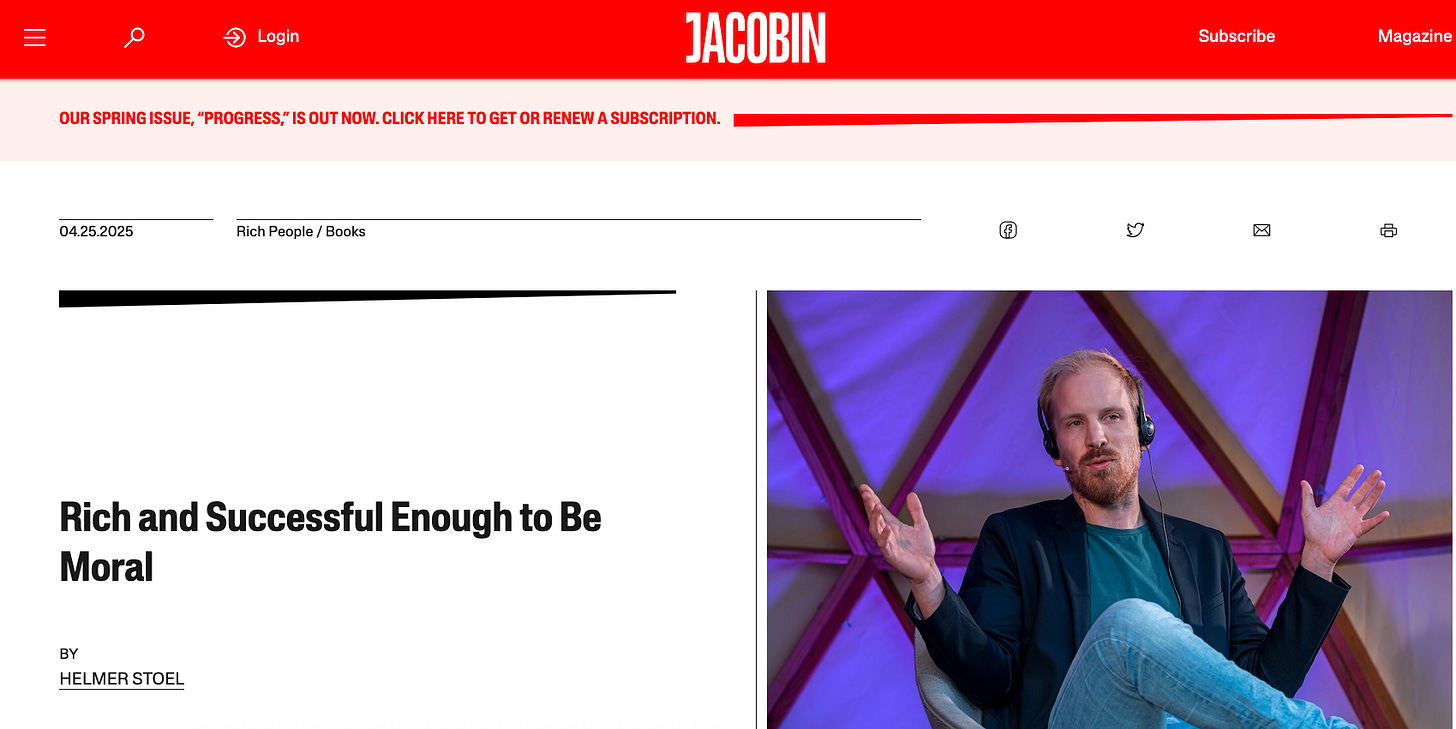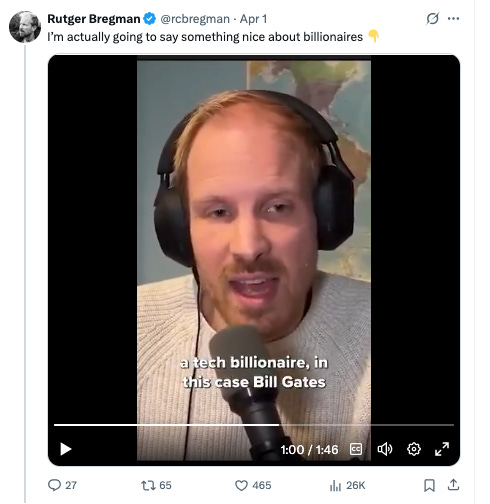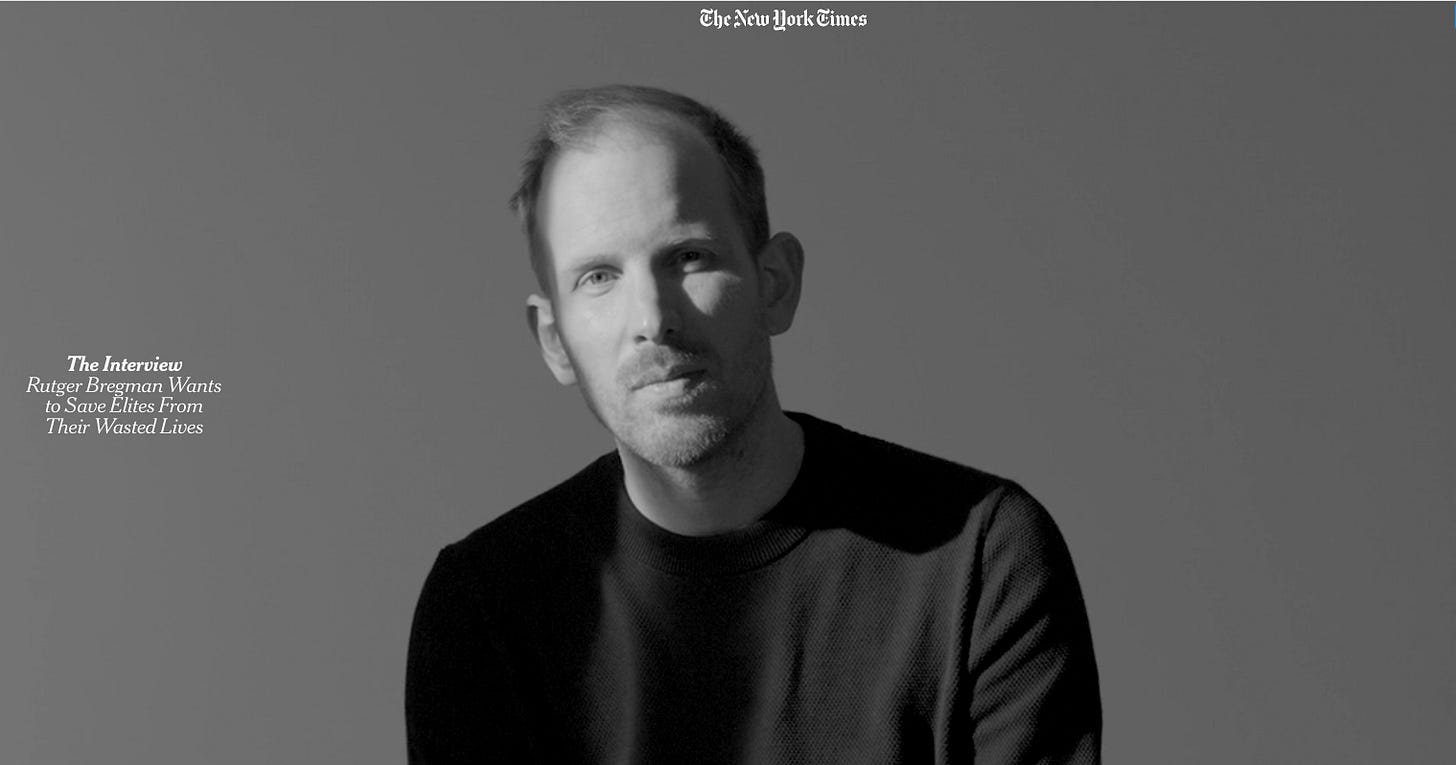Racism, Rihanna----and Rutger Bregman
After facing criticism around financial conflicts of interest and elitism, the Dutch writer now faces allegations of racism. Warning: this piece contains racist and sexist language.
In 2011, Dutch writer Rutger Bregman deployed a litany of racial slurs, like “niggabitch” and “negro,” in an essay that argued that Rihanna is too sensitive to racism. (Screenshot of Bregman’s op-ed in de Volkskrant.)
Dutch writer and political influencer Rutger Bregman—a darling of the liberal media, whose progressive bonafides I investigated two weeks ago (here)—now faces allegations of racism from a former insider at his non-profit.
On Sunday, Anita Naidu, a one-time advisor to Bregman’s NGO—the School for Moral Ambition—published a damning essay in CounterPunch, describing the institutional racism she witnessed at the non-profit. Explosively, the author connects her experience to a 2011 essay by Bregman, laced with racist and sexist language and arguments. Bregman’s piece criticizes musical artist Rhianna because she “couldn’t handle” being called the “ultimate niggabitch” in the Dutch media, by the fashion magazine Jackie.
Here’s Rihanna in her own words from 2011, publicly condemning the fashion magazine:
There are 1000’s of Dutch girls who would love to be recognized for their contributions to your country, you could have given them an article. Instead, u paid to print one degrading an entire race! That’s your contribution to this world! To encourage segregation, to mislead the future leaders to act in the past! You put two words together, with the intent of abasement, that made no sense…’N—A BITCH’?!….Well with all respect, on behalf of my race, here are my two words for you…F— YOU!!!”
As the scandal made international headlines, Bregman, a white man from The Netherlands, felt compelled to weigh in with his own op-ed—attacking Rihanna’s “overactive sense of justice” and “infantile whining.”
In his piece published in De Volkskrant—you should definitely read archived versions of it here or here—Bregman playfully, even gleefully, deployed a parade of slurs like ‘bitch,’ ‘niggabitch,’ ‘negro’ and ‘peanut.’
Bregman’s main thesis, as best I can decipher it, is that Dutch people—he was writing for a Dutch audience—are too enlightened to entertain Rihanna’s hand-wringing concerns about racism. At one point, Bregman seems to argue that because there are no genetic differences between races, there is no biological basis for racism—-thus racism cannot exist.
Here’s Bregman in his own words, translated from the Dutch:
In the Netherlands, we’ve known this for a long time…We don’t do racism, and we shouldn’t let ourselves be guilt-tripped by American nervous wrecks….Words only exist by the grace of the intentions with which they are used. In the Netherlands, we’re much more relaxed about negroes, peanuts, and bitches than elsewhere. That’s something we should be proud of.
Were whiter words ever before spoken? Is there a better, more powerful example in recent history of white privilege?
Press inquiries sent to Bregman at the School for Moral Authority, asking about the 2011 essay and Naidu’s first-person account, generated no response.1
UPDATE: After the story was published, Bregman issued a statement that included an apology for his 2011 essay—-but that was primarily organized around attacking me, and also Naidu. Read that story here.
Naidu is unsparing in her analysis of Bregman’s essay, describing in CounterPunch how he:
defended blackface, mocked anti-racist outrage, and dismissed singer Rihanna’s objection to being called a “niggabitch” by a Dutch magazine. This wasn’t satire or naivety—it was an unfiltered articulation of racial contempt dressed up as cultural commentary. He dismissed Black people’s pain as American neurosis, ridiculed the idea that racialized people experience systemic harm or that racism exists in the Netherlands, and reduced centuries of colonial violence to punchlines. He didn’t just look away from injustice—he laughed at it.
Naidu’s essay adds to a growing body of criticism Bregman has faced in recent weeks, which directly challenges the Dutch writer’s ambitious media and social media campaigns to position himself as a leading progressive intellectual. But, fairly stated, Naidu’s criticism comes against a backdrop of praise from mainstream outlets like The Guardian, which has three times amplified Bregman’s ‘moral ambition’ movement in recent months. Political commentators like Trevor Noah and Jon Stewart have also endorsed and amplified Bregman as an important political thinker and writer in recent weeks.

More progressive voices, meanwhile, have sharply criticized Bregman. Jacobin recently derided Bregman’s “moral ambition” project as, essentially, a finishing school for the global elite. (Bregman’s work on “moral ambition” appears aimed at pushing young elites to abandon their careers in finance and consulting, and instead devote their lives to fighting for political causes Bregman supports.)
My own reporting—an investigation published two weeks ago—uncovered major financial conflicts of interest related to Bregman’s zealous efforts to play political expert on billionaires and taxing the wealthy. While centering himself in these political debates—often with watered-down critiques—Bregman has kept oddly quiet about his non-profit’s taking donations from billionaire philanthropies, which I unearthed.
He built a brand criticizing billionaires. Are billionaires now bankrolling his work?
If you follow the public debate over extreme wealth, you may at some point have heard the name Rutger Bregman. The Dutch writer made a splash at the 2019 World Economic Forum when he publicly condemned the vapid promises of the…
In Bregman’s story we might see another distillation of the fracturing political identities on the left. As some liberal American voters cling to an Obama-Biden-Clinton style of centrist, incrementalist politics, or a vapid anti-Trump animus—which lost Democrats the 2024 election to Donald Trump—a growing body of more progressive voices today push the Democratic party toward more radical policies, aimed at aggressively challenging oligarchy, fighting racism, redistributing wealth, and pursuing bold solutions to climate change.
Bregman appears to reside in the former camp, offering mild solutions that only look and seem progressive. As I wrote in my first profile, this has made him popular with liberal news outlets that sit on the same line of the political spectrum. Or as Naidu assesses things, Bregman is a “a stage-managed liberal rebel, perfectly engineered for the algorithm, saying just enough to look brave without ever endangering the structure that embraced him.”
In a splashy interview with the New York Times last weekend, Bregman was asked to define his concept of “moral ambition.” As an example, he described his “personal hero,” the British abolitionist Thomas Clarkson. Bregman’s hero narrative gives outsize, almost singular, credit to Clarkson for ending slavery.
“If a couple of people, like Thomas Clarkson, had fallen off their horse [and died]…that would have been very bad news. The history could have looked very different,” Bregman told Times’s interviewer David Marchese.
Marchese didn’t question Bregman’s white-savior, big-man version of history, but Naidu did in her essay. She accuses Bregman of erasing ‘the global context and complexity of abolition, offering no acknowledgment of the centrality of Black resistance, maroon communities (self-governed settlements of escaped enslaved people), or the Haitian Revolution. This reinforces a colonial narrative where progress is granted by enlightened elites instead of seized through collective struggle and insurrection.”
What makes Naidu’s essay so compelling is the evidence she marshals—-not just Bregman’s regressive 2011 essay, not just the white-savior narratives he leans on (or inhabits), but also her personal experience as an advisor to Bregman’s non-profit.
Naidu recounts an invited presentation she gave on “systemic racism,” in which she “stressed the need to center racial justice” in the NGO’s work. “I laid it out plainly: if the School for Moral Ambition were truly about justice, it would do one thing—shift power away from elites and into the hands of those most affected by injustice. Instead, it does the opposite.”
There’s an even larger context that we should consider with Bregman. His vaguely defined body of work around ‘moral ambition’ could be seen as a light rebrand of the embattled Effective Altruism (EA) movement, which also calls on the global elite to use their smarts (and money) to make a difference. (Bregman, not infrequently, is asked about the thru-lines between his “moral ambition’ movement and EA.)
EA faced a major black eye in 2023 when a leading figure associated with the movement, philosopher Nick Bostrom, was exposed for having written (years earlier on an online message board) that “Blacks are more stupid than whites.” Bostrom appears to have been 23 years-old at the time he wrote that—-the same age Bregman was when he wrote his essay about Rihanna. But unlike Bregman, Bostrom has offered a response and an apology. (Though his apology at times almost makes him seem like a victim. You can read Bostrom’s apology and explanation here.)
Effective Altruism faced another crisis when one its biggest practitioners, advocates and funders turned out to be a fraud. Crypto tycoon Sam Bankman-Fried claimed that the reason he was hoarding billions of dollars through crypto investments was so that he could eventually give it all away and save the world. Today Bankman-Fried is serving a 25-year prison sentence for fraud—victims of which include a schoolteacher’s pension fund, which wrote off $95 million in losses.
Bregman’s School for Moral Authority appears to have attracted at least one crypto billionaire. After I published my profile of Bregman, multiple sources contacted me about Bregman’s association with Mike Novogratz, CEO of the crypto company Galaxy Digital. Bregman, after much public pressure, appeared to confirm the ties on social media, saying he was “proud to be supported” by Galaxy Gives, a philanthropic body that Novogratz heads up.
If Bregman is so proud, then why doesn’t his non-profit public disclose this relationship on its website? And why did the School for Moral Authority repeatedly refuse to confirm a relationship when I asked directly?
As journalist Marieke Kuypers reports, above, Novogratz’s company, Galaxy Digital, in March agreed to a $200 million settlement with the New York Attorney General over fraud charges. (In the settlement, Galaxy neither admitted nor denied the Attorney General’s findings.) Galaxy also appears to have donated a million dollars to Donald Trump’s inauguration.
Repeated press inquiries to Bregman and his non-profit over recent weeks—asking for a full list of its funders, a list of its board of directors, and transparency about its relationship to Novogratz—generated promises of a response, but nothing else. (I also got no response from Novogratz or Galaxy Gives, who I contacted this morning. If I get a response, I will update the article).
Bregman’s posture of non-transparency and non-accountability is difficult to understand outside the concept of privilege, entitlement and hubris. His conduct signals a self-righteous belief that he, somehow, is beyond reproach because what he’s doing is so important. And so morally ambitious.
I’ll give Naidu the last word—and encourage everyone to read her powerful essay in CounterPunch (which will be removed from paywall next week):
[Bregman’s] current branding as a guide for the ethically ambitious isn’t just hollow—it’s dangerous…. By absorbing the aesthetics of rebellion. By mimicking its language. By offering curated versions of “impact” that pose no real threat. Bregman is fluent in this script. He knows how to perform disobedience just long enough to remain invited to the table. He doesn’t challenge structures—he critiques individuals, nameless billionaires, or specific abuses, never the underlying systems.
And this is what SMA [the School for Moral Ambition] teaches. It’s not moral ambition. It’s moral camouflage.
I’ve looked at different translations of Bregman’s piece, written in Dutch, and I don’t think anything is being ‘lost’ in translation. But to be absolutely sure, I shared with Bregman the entire copy of the translation I used, asking for any corrections. Bregman did not respond.










